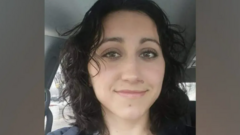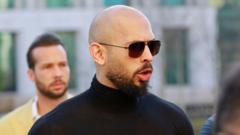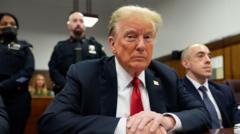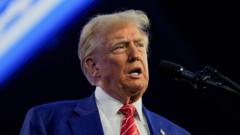Luigi Mangione, facing murder charges in New York for the death of healthcare executive Brian Thompson, is currently fighting extradition from Pennsylvania. Legal experts suggest his defense faces steep challenges due to substantial forensic evidence linking him to the crime scene, while his attorney contemplates various defense strategies.
Legal Hurdles Await Luigi Mangione in Murder Case
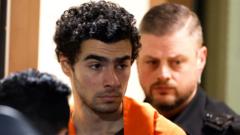
Legal Hurdles Await Luigi Mangione in Murder Case
Extradition battle looms as evidence mounts against accused in shooting of healthcare CEO.
Article Text:
Luigi Mangione's legal saga is gearing up as he faces serious charges in New York, including second-degree murder in connection with the death of healthcare insurance CEO Brian Thompson. The 26-year-old was arrested in Pennsylvania after a prolonged manhunt, with authorities citing strong forensic and ballistic evidence, including fingerprints and shell casings, that supposedly ties him to the crime scene. This evidence is anticipated to complicate his defense strategy, as former prosecutors highlight the difficulties in contesting the charges under such circumstances.
Mangione’s legal counsel, Thomas Dickey, maintains a stance of innocence, famously stating he has yet to see incriminating evidence. In Pennsylvania, Mangione has entered a not guilty plea regarding his firearms charges, but the approach for his murder charge in New York remains undecided as he battles extradition. Experts predict that the legal struggle over his transfer to New York may stretch on for more than a month, potentially providing the defense team with insights into the prosecution's case.
Former prosecutor and legal commentator Mitchell Epner offers two primary defense avenues for Mangione if he maintains a not guilty plea: either asserting wrongful identity or claiming responsibility with mitigating circumstances. The nature of evidence against him, including possession of a firearm akin to that used in the murder and possession of a silencer and fake identification, casts significant doubt on the feasibility of the first defense.
Additionally, legal authorities suggest a potential but risky route could involve questioning Mangione's mental fitness for trial, which may postpone proceedings indefinitely. This path differs from an insanity plea, as a successful mental fitness argument would lead to institutionalization rather than acquittal.
Online fundraising initiatives have begun to surface, showing a surprising level of support for Mangione while simultaneously revealing the darker emotions stemming from tensions within the healthcare industry. Following Thompson's death, the New York Police Department issued warnings regarding ongoing threats to other healthcare executives, possibly fueled by online activism against the corporate sector.
As Mangione navigates this turbulent legal landscape, experts warn that the combination of public sentiment and existing grievances against the health insurance industry could incite further unrest, raising concerns about potential copycat incidents inspired by his case.
Luigi Mangione's legal saga is gearing up as he faces serious charges in New York, including second-degree murder in connection with the death of healthcare insurance CEO Brian Thompson. The 26-year-old was arrested in Pennsylvania after a prolonged manhunt, with authorities citing strong forensic and ballistic evidence, including fingerprints and shell casings, that supposedly ties him to the crime scene. This evidence is anticipated to complicate his defense strategy, as former prosecutors highlight the difficulties in contesting the charges under such circumstances.
Mangione’s legal counsel, Thomas Dickey, maintains a stance of innocence, famously stating he has yet to see incriminating evidence. In Pennsylvania, Mangione has entered a not guilty plea regarding his firearms charges, but the approach for his murder charge in New York remains undecided as he battles extradition. Experts predict that the legal struggle over his transfer to New York may stretch on for more than a month, potentially providing the defense team with insights into the prosecution's case.
Former prosecutor and legal commentator Mitchell Epner offers two primary defense avenues for Mangione if he maintains a not guilty plea: either asserting wrongful identity or claiming responsibility with mitigating circumstances. The nature of evidence against him, including possession of a firearm akin to that used in the murder and possession of a silencer and fake identification, casts significant doubt on the feasibility of the first defense.
Additionally, legal authorities suggest a potential but risky route could involve questioning Mangione's mental fitness for trial, which may postpone proceedings indefinitely. This path differs from an insanity plea, as a successful mental fitness argument would lead to institutionalization rather than acquittal.
Online fundraising initiatives have begun to surface, showing a surprising level of support for Mangione while simultaneously revealing the darker emotions stemming from tensions within the healthcare industry. Following Thompson's death, the New York Police Department issued warnings regarding ongoing threats to other healthcare executives, possibly fueled by online activism against the corporate sector.
As Mangione navigates this turbulent legal landscape, experts warn that the combination of public sentiment and existing grievances against the health insurance industry could incite further unrest, raising concerns about potential copycat incidents inspired by his case.




